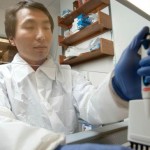
A vaccine has been discovered by Professor Michael Houghton that will potentially help combat hepatitis C. Professor Houghton, Li Ka Shing Chair in Virology at the University of Alberta, also led the team that discovered the hepatitis C virus in 1989. Currently, there are no vaccines against the disease available.
The vaccine was developed from a single strain and has been shown to be effective against all known strains of the virus. It took more than 10 years to develop and following previous vaccine tests funded by the Canadian National Institutes of Health that yielded promising results.
Professor Houghton noted that there remained two critical questions. “Did the recipients actually produce antibodies that could neutralize the actual infectious virus,” he asked, “and if they could, how broad was the neutralizing response?”
The challenge, according to Houghton, was that hepatitis C is more virulent than HIV, thus coming up with a vaccine that would neutralize the different strains around the world was believed to be impossible. Using a vaccine developed and tested on humans, Houghton and his co-investigator Professor John Law discovered that the vaccine was capable of eliciting broad cross-neutralizing antibodies against all the different major strains. This finding bodes good news for those with hepatitis C and those who live or travel to areas where the disease is prevalent.
“This tells us that a vaccine made from a single strain can indeed neutralize all the viruses out there,” says Houghton. “It really encourages the further development of that vaccine. This is a really a big step forward for the field of HCV vaccinology.”
With hundreds of thousands of people being infected with hepatitis C annually, and with between 20 to 30 percent of those developing some form liver disease, this announcement brings hope. Houghton cautioned that further testing is required, meaning that it may be five to seven years before the vaccine receives approval, and while it may make some difference in those currently suffering from hepatitis C, it is mainly a preventative measure against acquiring the disease.
Source: University of Alberta

















